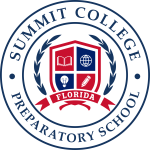English 9 (Standard)
Narrative craft, rhetorical analysis, research foundations, grammar in context, and structured revision cycles to build fluent academic voice.
Gifted & Multilingual Learners · Grades 9–12 · Founded 2025
Start August 4, 2025 • End May 30, 2026 • 194 instructional days • Schedule: Mon–Sat • Format: live faculty-led + structured independent work
The 9th Grade Program Overview at Summit College Preparatory School formalizes the beginning of high school and defines the habits, pace, and confidence that carry a student through graduation. Grade 9 is not a continuation of middle school; it is a structural reset. Students move into faculty-led seminars, higher order problem solving, and authentic assessments that verify what they can actually do. Therefore, we design the year to build durable skills: planning weekly work, annotating with purpose, drafting and revising to criteria, presenting ideas with evidence, and solving mathematics step-by-step with clarity.
Academically, Grade 9 establishes the base for advanced coursework. English instruction emphasizes fluent composition and argument; mathematics centers on modeling and multiple representations; biology develops inquiry and data literacy; and world history builds comparative analysis across civilizations. Multilingual formation begins deliberately so vocabulary, structure, and oral practice accumulate into real proficiency. As early wins compound, students gain momentum and resilience.
Just as important, roles and supports are explicit. Teachers provide direct instruction and timely feedback; students practice reflection, self-correction, and professional communication; families partner through scheduled check-ins so guidance is proactive rather than reactive. Learning is verified through essays, labs, problem sets, projects, and oral defenses because credit should represent demonstrated mastery, not seat time. With a 194-day calendar and clear checkpoints, learners pace effort, protect wellness, and finish strong. For official dates, see the Academic Calendar; statewide information is available at the Florida Department of Education.
Narrative craft, rhetorical analysis, research foundations, grammar in context, and structured revision cycles to build fluent academic voice.
Linear functions, inequalities, systems, and statistics with multiple representations; methods are explained and justified for transfer.
Cells, genetics, evolution, and ecology through inquiry based labs; students write formal lab reports using claims-evidence-reasoning.
Comparative themes across civilizations governance, belief systems, exchange networks with emphasis on primary sources.
Placement based continuation focused on communication, structure, and cultural literacy; aims toward CEFR A2 proficiency by year’s end.
Studio foundations in drawing, composition, and critique; creative problem solving supports observation, design, and expressive technique.
Students begin or continue Spanish, French, German, or Mandarin on a structured pathway that balances communication tasks, grammar frameworks, and culture. While French 2 is part of the Grade 9 core above, other placements are available based on proficiency. Long-term aim: advanced proficiency with international certification in later grades.
Computing concepts, algorithmic thinking, collaborative projects, and reflective documentation.
Fitness planning, health literacy, and wellness routines that support sustainable academic performance.
Fall Term: August 4 – December 20, 2025 • Spring Term: January 5 – May 30, 2026
Midterms: Oct 27–31 (Fall) • Feb 23–27 (Spring)
Finals: Dec 15–19 (Fall) • May 26–30 (Spring)
Breaks & Holidays: Labor Day, Fall Break, Thanksgiving, Winter Break, MLK Jr. Day, Spring Break, Good Friday
TI-84 Plus CE Python (or approved equivalent) for mathematics and data work.
Laptop or desktop with reliable broadband; integrated or external webcam (720p+); headset with microphone; digital writing tablet (pen-enabled tablet with active stylus, approx. 8–11 in) for handwriting and math; and a printer or mobile scanning app for clean submissions.
Live instruction is delivered on Zoom Pro. Microsoft 365 (Word, Excel, PowerPoint, OneDrive) is accessed via ClassLink single sign on for documents and collaboration. Work is submitted through Microsoft 365 or during Zoom sessions as directed; direct teacher–student coordination is available via WhatsApp Business.
Credit reflects verified mastery essays, problem sets, labs, projects, and oral evaluations. Attendance supports learning; however, it never substitutes for performance evidence. Each student follows an Individual Learning Plan reviewed every term with families, ensuring early intervention and purposeful acceleration when appropriate.
Summit offers three university aligned diploma pathways spanning Grades 9–12. The Standard Diploma (22 credits) fulfills core graduation requirements and supports broad college entry. The Honors Diploma (24 credits) adds depth through multiple honors courses and advanced projects for competitive admissions. The College Preparatory Diploma (26 credits) is our most rigorous track, emphasizing advanced coursework, research, and multilingual credentials for selective universities in the U.S. and abroad. Details, credit totals, and sample sequences appear on the Academics page.
Finalize device and materials, review dates in the Academic Calendar, and connect with Admissions for placement and scheduling. A purposeful Grade 9 start turns potential into performance and sets a confident trajectory toward university study.
